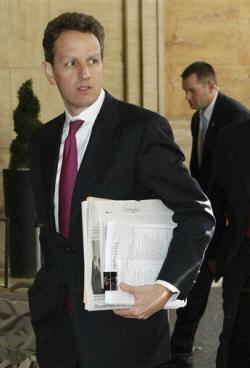|
 Geithner seeks to sell US crisis approach Geithner seeks to sell US crisis approach
 Send a link to a friend
Send a link to a friend
[February 14, 2009]
ROME (AP) --
Treasury Secretary Timothy Geithner, coming off a rocky week in Washington, is trying to persuade the world's other major powers that the Obama administration has the right prescription for what ails the global economy.
Geithner is meeting with finance ministers of the Group of Seven major industrial countries to sell them on the idea that Obama's program of massive government spending coupled with tax cuts will help fix the worst crisis to hit the global economy in seven decades.
|
|
 And to deal with the equally critical challenge of frozen credit markets, Geithner has advanced a plan to pump as much as $2 trillion in government and private money into the troubled banking system. And to deal with the equally critical challenge of frozen credit markets, Geithner has advanced a plan to pump as much as $2 trillion in government and private money into the troubled banking system.
But both programs have run into doubts and criticism at home. The administration's overhaul of a mammoth financial rescue program was met with loud catcalls from the markets on Tuesday, with the Dow Jones industrial average plunging by 382 points as investors showed their displeasure over major gaps in the program. On Friday, Republicans balked at the $787 billion economic stimulus bill awaiting President Barack Obama's signature. Not a single Republican voted for it in the House. Only three Republicans voted for it in the Senate.
Despite skepticism at home, Geithner is likely to score a victory at the G-7 meetings, which bring together officials from the United States, Japan, Germany, Britain, France, Italy and Canada. Their final communique on Saturday is expected to endorse in broad terms the approach the U.S. is taking.

Geithner has significant credibility among finance ministers, having served in key international positions in the Clinton administration during the 1997-98 Asian currency crisis, when a U.S. effort led by then-Treasury Secretary Robert Rubin and then-Federal Reserve Chairman Alan Greenspan brought the global economy back from the brink of catastrophe after plunging currency values had pushed many countries into recessions.
As president of the Federal Reserve Bank of New York before moving to Treasury, Geithner also helped draft the original bailout plan last fall with then-Treasury Secretary Henry Paulson. Paulson's approach was roundly criticized for its frequent revisions and reversals. Geithner readily admits he'll have to make revisions, too.
"We are going to have to adapt our program as conditions change," Geithner told Congress. "We will have to try things we never tried before. We will make mistakes. We will go throughout periods in which things get worse and progress is uneven or interrupted."
[to top of second column] |
 Geithner flew into Rome on a military jet with Federal Reserve Board Chairman Ben Bernanke and went immediately into a series of one-on-one meetings to brief U.S. allies on U.S. efforts to confront the crisis.
If it was any consolation, Geithner had plenty of company in the woe-is-me department. In fact, the meeting of major industrial powers could well be dubbed the "Misery Loves Company" summit. No country has been spared in the painful economic downturn.
The new approach on the banking problems put together by Geithner would harness $1 trillion to $2 trillion in bailout funds, Federal Reserve support and private sector money to get credit flowing more normally.
At the G-7 meetings, Geithner was expected to defend, as he did before two congressional hearings this week, the lack of details in the proposal.
"I understand the desire for details, and I understand the appointment about the lack of details," Geithner told the Senate Budget Committee on Wednesday. "But part of the disappointment is because people were hoping that we do things, that, in my judgment, would have been too generous and not responsible for taxpayers' money."
Aides said Geithner was ready to elaborate on those views in the G-7 decisions and defend the decisions the Obama administration has taken.
[Associated
Press; By MARTIN CRUTSINGER]
Copyright 2009 The Associated
Press. All rights reserved. This material may not be published,
broadcast, rewritten or redistributed.
 |